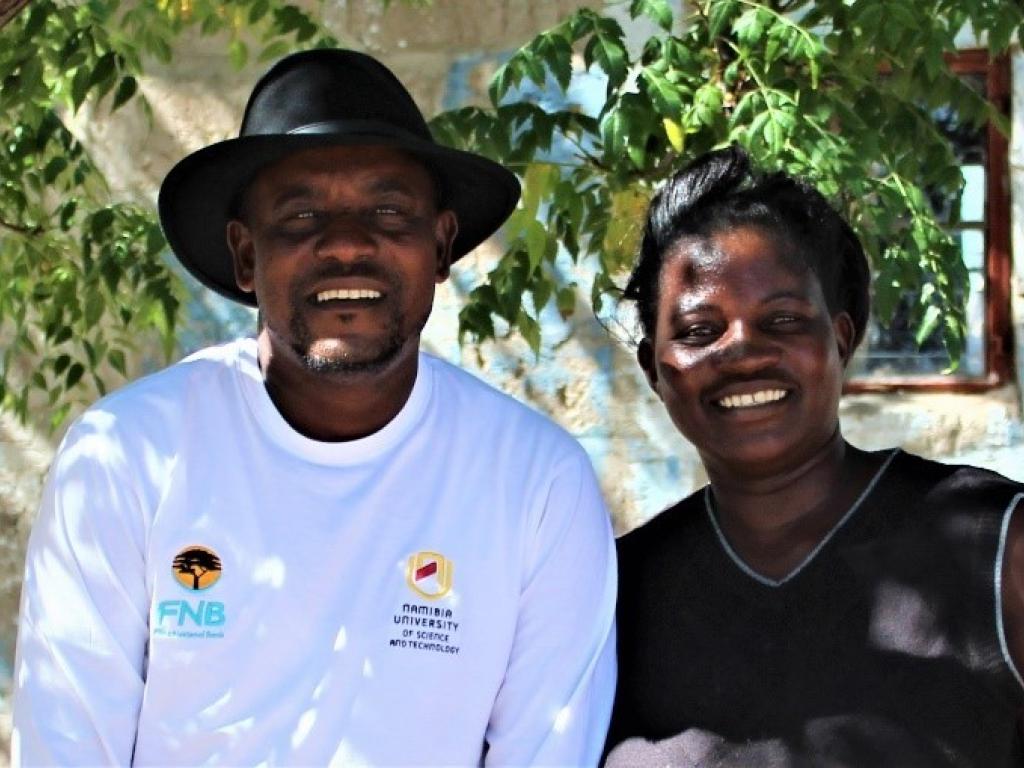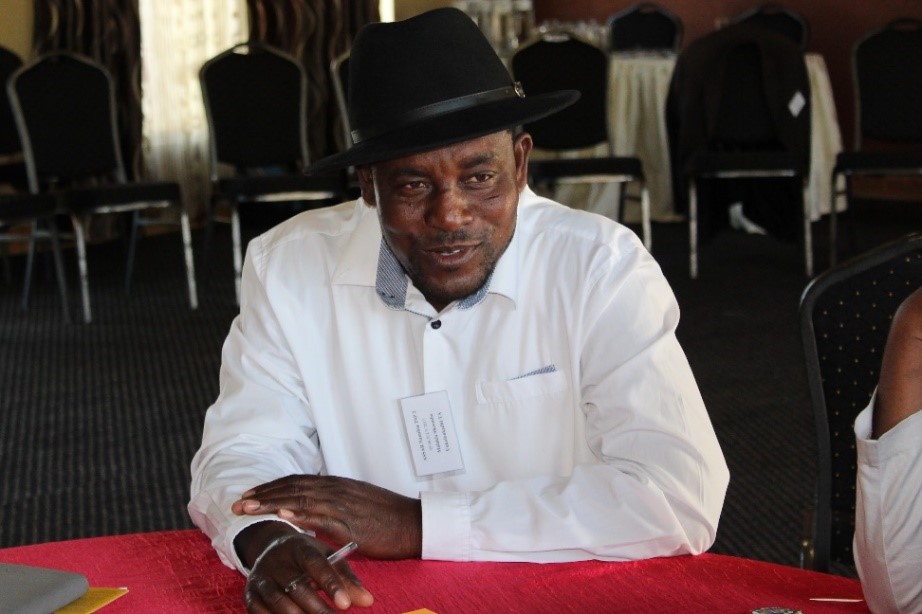Tate Malakia: Inspiring hope in Onesi

By Julia Davies
Whereas some might envision a champion to exude qualities such as valour and physical prowess, it is our experience at ASSAR that real champions are characterised by qualities like generosity, enthusiasm, kindness and resourcefulness. These champions may not wear superhero capes or have a cabinet full of trophies. In fact, they might not even be aware that they are champions at all! From an ASSAR perspective, Tate Malakia is one such humble champion who lives up to the meaning of his name, and who is thus deserving of recognition.
Malakia and his wife at their home in Onesi Constituency
Who is Malakia?
49 year old Malakia Shoombe is the Secretary of the Uukolonkadhi Traditional Authority of Onesi Constituency in north-central Namibia, a position that he has held since 1996. He is also, like his father and brother before him, the headman of his local village. Malakia is a husband, a father of six and – in the eyes of ASSAR - a local champion. Despite the significant demand on his time and energy that comes with wearing so many different hats, Malakia has played a key role in the success of ASSAR in Namibia.
“I have noted that Mr Malakia has been very influential to the ASSAR research project … I honestly think he has contributed a lot to the success of ASSAR engagements at village and constituency levels” [Margaret Angula, 2017].
The role of local champions in the literature
Crosby and Bryson (2010: 219) define a champion to be “a person who is a tireless, process-savvy organizer and promoter of the change effort.” Increasingly, researchers have recognized the important role played by champions in driving climate change adaptation and mitigation agendas at the local level. Such a person can hold various positions and may be a politician, a public official, an industry or academic expert, or even a representative from an NGO or civil society interest group. Champions emerge most strongly amongst individuals who are passionate about and committed to resolving an issue, proactive about identifying and leveraging opportunities, who are optimistic, insightful and are able to suppress the need to be an expert authority. In addressing complex problems such as climate change, it is necessary that these individuals play an ‘integrative leadership’ role to unite diverse actor groups across sectoral boundaries to achieve a common goal.
What makes Malakia a champion?
Malakia became involved in the ASSAR project a number of years ago when he was approached by ASSAR researchers and students from the University of Namibia. These researchers needed to conduct interviews with stakeholders in the area, and were looking for help with gaining access to the local villages. Despite the long line of people waiting outside his office to seek his counsel and resolve domestic disagreements, petty crime and land dispute issues, Malakia did not hesitate to offer his assistance. He has been a great help ever since and, according to one ASSAR researcher, he is “one of the most generous T.A. [traditional authority] secretaries any researcher could wish to work with. A single visit to his office will give you so much to contemplate … he understands the value of research and he is keen to assist you in every way” [Salma Hegga, 2017].
Having grown up and completed his schooling in Onesi, Malakia is well known and respected amongst the locals. He has also experienced, first hand, many of the climate-related challenges that have impacted the region, which is highly vulnerable to both droughts and floods. Malakia’s invaluable local knowledge is complemented by his understanding of the value of research, which he has become more aware of through his travel experience, his interaction with diverse stakeholders and his active participation in various workshops. This includes ASSAR’s Vulnerability and Risk Assessment (VRA) workshop held in the Omusati Region in March 2016, the production of the ASSAR drought video in Omusati Region and both the first and second Transformative Scenario Planning (TSP) workshops that were held in February and July of 2017, respectively.
“I’ve got a lot of experience from exchanging visits from different places. And also to receive different visitors at my office. I experience a lot from them, from the visitors and from the projects…because you know traditional is so cross-cutting, different institutions just invite us for a workshop, for training. That is why I’ve got more knowledge.” [Malakia, 2017].
Malakia (back & centre) participating in a group activity during the second Transformative Scenario Planning (TSP) workshop held in Ongwediwa in July 2017.
Whether it’s the combination of his home-grown knowledge and broader education, or simply his natural intelligence, empathy and leadership ability, Malakia has proven to be an effective link between ASSAR and the local people in Onesi. As explained by Ester Nangolo of ASSAR Namibia, “he is very helpful. He understands ASSAR so well that … we do not even need to keep briefing him about ourselves. We now only go ahead and request him to organise a particular group of community members for our meetings or interviews and he is doing well in getting everyone together” [2017]. Moreover, he has demonstrated his ability to clearly communicate the needs of the researchers, not only to the right people, but in the right manner. The latter point is important, given the cultural (and other) differences that may sometimes cause tension or discomfort to arise. This is shown in a researcher’s comment that:
“Malakia knows how to communicate with the community he is serving. He can filter the information you have given him easily to relevant stakeholders … His wealth of knowledge of the community he is serving is an added advantage as he can advise us well in advance on how to approach the community, what is going to work and what is not going to work for us as researchers” - [Salma Hegga, 2017].
Often in research, we find that rich local knowledge becomes lost, somewhere in the vast information and communication gap that tends to exist between the domains of science and practice. This gap is often manned by a gatekeeper whose sole (sometimes self-declared) mandate seems to be limiting access to key information and stakeholders, for example by failing to share important information and contact details, or simply by being unhelpful when help is needed. However, if this is the rule of gatekeepers, then Malakia is the exception. This is illustrated by the experience of ASSAR’s Margaret Angula, who found that “[he] has been resourceful in giving us guidance at the local level - regarding the identification of institutions, useful contacts, names and cell phone numbers of village headmen and the identification of villages. And for me he is currently making my appointments with the four villages I am going to see next week” [2017].
Malakia has maintained an open door policy, often going out of his way to assist ASSAR and even making himself available after hours and at weekends. For example, in one of their visits to Onesi, Malakia was approached by ASSAR researchers who were interested in the impact of climate change on livestock farming, which is a key livelihood activity in the region. Whilst Malakia could simply have answered a few questions, pointed them in the right direction or referred them to someone else, he instead took the time to show them the village cattle posts (where cattle are kept separately from the residential area of the village) and the boreholes, which are used to supply water to the cattle. He also arranged an informal interview with one of the cattle herders, and explained some of the challenges that the community faces in terms of ensuring that they have enough water and grazing for their livestock.
Mr. Malakia (left) introducing some Master’s students to a village headman in Onesi.
The extra effort that Malakia puts in for ASSAR is balanced by his strong commitment to his people, who love and trust him as their traditional leader: “he knows his people and what is happening to the people he is serving” [Salma Hegga, 2017]. Whilst working with him, researchers have noticed his ability to juggle these different priorities, for instance by putting an ASSAR-related meeting on hold to deal with a local matter of urgency. This quality is admirable and shows that Malakia is a man of fairness and integrity, and that his willingness to go the extra mile is not reserved only for ASSAR but is extended to all those under his jurisdiction. Through his work with people from diverse backgrounds (including ASSAR researchers and the local people whom he is passionate about), Malakia has come to realize the need for collaboration and has developed the qualities of an integrative leader. This is shown in his comment that “its [important for] every stakeholder to participate…and when there is a meeting or a workshop, we have to attend that workshop so that we can bring something in our region, because together we can make a difference” [Malakia, 2017].
Malakia’s positive outlook and his desire to see changes in his community through the work that researchers are doing is inspiring. However, the nature of empirical research is such that things do not always go according to plan. Be it an absent interviewee, a flat tyre or a technological faux pas, it is always wise to remain flexible and adaptable whilst in the field. This is particularly true when one is faced with the added challenges of a significant language barrier and the absence of detailed roadmaps, such as is the case in Onesi (or at least in the very rural areas thereof). Under these circumstances, it is necessary to call on someone who can offer support and guidance. Luckily for ASSAR, Malakia is blessed not only with the ability to work effectively in a challenging environment, but also the willingness to do so, and to remain highly flexible so as to provide the best support possible to ASSAR.
Malakia is a true champion who has been highly influential in the success of ASSAR in Namibia. Without him, much of the research conducted in Onesi Constituency thus far would not have been possible. When asked why he helps ASSAR as much as he does, his simple answer is that it is his duty as a traditional leader and that he does it for the good of his people, in the hope that something tangible might emerge from the project that would benefit his community:
“We are the lucky ones, to have our region and our constituency … selected to be assisted in many ways by [the] ASSAR project. And even us, we learn more also from ASSAR. Because it opened our mind that in case we find ourselves in a different situation, we have to adapt to that situation in a way that can help us, by surviving during the flood and during the drought. But we still need more information or assistance from ASSAR. Maybe in future there will be something visible which brought out by ASSAR in Onesi” [Malakia, 2017].
The key question is now, what can ASSAR do to give back to Malakia and to help uplift the vulnerable people of Onesi, as they struggle to build resilience to the impacts of climate change?

Mr. Malakia Shoombe, a champion of ASSAR in Namibia.